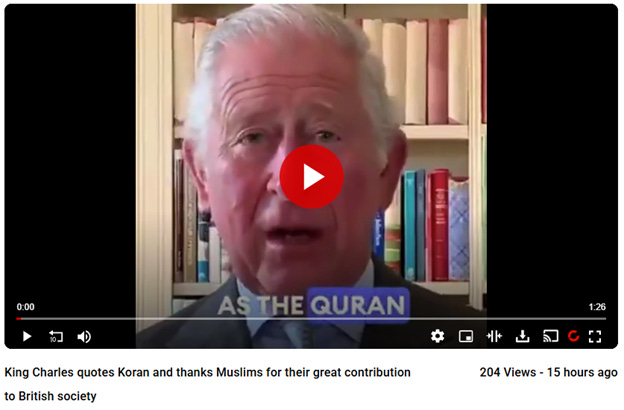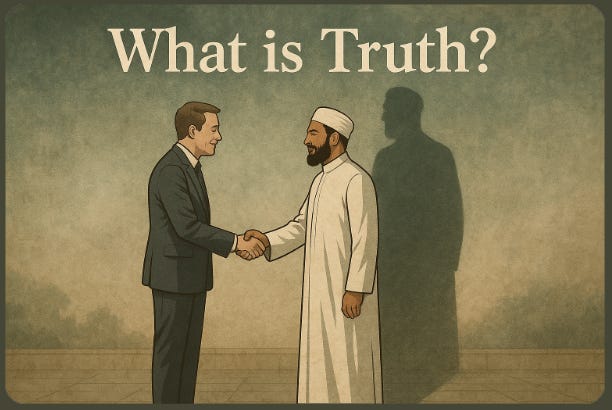In discussions about Islam, one of the greatest and least understood obstacles is the difference in how fundamental concepts are defined. Chief among these is the word “truth.” For most Westerners, truth is something discovered through reason, evidence, dialogue, or lived experience. But in Islam, truth is not discovered; it is revealed through sharia, with Allah as the ultimate source.
Koran 9:29 Fight those who do not believe in Allah and the Last Day and do not consider unlawful what Allah and His Messenger have made unlawful and do not adopt the religion of TRUTH [sharia] from among those who were given the Scripture — until they pay the jizyah out of hand while they are humbled.
In this way Islamic truth is not truth as the ‘West’ understands it. Sharia — Islamic law — encompasses virtually every aspect of life, and truth must conform to it. On one hand, sharia allows for strategic deception when it serves a ‘religious’ (sharia) purpose; on the other, it is entirely fixed and unalterable, derived from the ‘revelations’ of Allah — every word of which was uttered by Mohammed — plus his example (the Sunnah).
Selective Quoting: The Case of King Charles’ Ramadan Message
A perfect example of how Islamic texts are selectively quoted for Western audiences is Koran 2:286:
“Allah does not burden a soul beyond that it can bear…”
To a Western audience, this sounds comforting — implying fairness and divine mercy. But in Islamic doctrine, this verse is used to justify suffering under sharia, arguing that:
Strict Islamic punishments (e.g., amputation, flogging, execution for apostasy) are never unfair because Allah ensures no one is “burdened” beyond their capacity.
Women must accept polygamy, lesser inheritance, and legal inequality — if it were unbearable, Allah wouldn’t have decreed it.
Jihad and martyrdom are presented as bearable obligations because Allah does not burden a soul beyond its ability.
But what happens when the full verse is hidden?
In this Ramadan message, King Charles quoted Koran 2:286, offering it as a call for patience and resilience [1]. However, he conveniently omitted the final part of the verse, which in Arabic reads:
“Our Master, so give us victory over the disbelieving people.”
The prayer for victory over disbelievers is integral to the verse, yet it is often left out when cited for interfaith messaging. This is a textbook example of how Islamic texts are selectively quoted to mislead non-Muslims, concealing their full doctrinal meaning.
This is another example of Islamic truth as submission, where suffering is not an injustice but a divine test that cannot be questioned. The same words — burden, fairness, justice — mean something entirely different in Islamic law than they do in Western thought.
Non-Negotiable Truths in Sharia
In ‘A Treatise on Disputation and Argument’ Mr. Chowdhury writes in his introduction “Truth must always be served and delivered with the loftiest and sublime character” [2].
“One should not debate with the nonbeliever about the branches of the Sharia because he does not believe in their basis. One should not debate with nor argue with him about marriage to four wives, testimony of women, the jizya, inheritance, prohibition of alcohol and other such rulings” (p.187-188)
These are ‘revealed’ truths, and therefore not debatable. But as already mentioned, sharia encompasses virtually every action, not just spiritual matters. There are even hadiths prescribing how to brush one’s teeth — leading to a brisk market for ‘miswak’ (tooth twigs).
Consequently, ‘Truth’ in Islam translates into behaviour and is measured by its conformity to sharia:
“…the good of the acts of those morally responsible is what the Lawgiver (syn Allah or His messenger) has indicated is good by permitting it or asking that it be done. And the bad is what the Lawgiver has indicated is bad by asking it not be done. The good is not what reason considers good, nor the bad what reason considers bad. The measures of good and bad… is the Sacred Law, not reason.” (ROT a1.4)
This disconnect lies at the heart of many failed expectations in dialogue and policymaking. The same words are used, but with profoundly different meanings. And in many cases, that ambiguity is allowed to persist — or even encouraged — because it serves a strategic purpose.
Islamic Rulings on Deliberate Ambiguity
To illustrate, here is a reply from an Islamic religious scholar from a Q&A website [3]:
QUESTION:
“When is deliberate ambiguity valid? If that is in cases of necessity only, then what is the definition of necessity in this case?”
ANSWER:
“Koran 7:26 With regard to the meaning in sharee’ah (religious) terminology, it refers to someone who says something that may appear to have one meaning to the listener but the speaker intends something different that may be understood from these words.”
“Deliberate ambiguity is permissible if it is necessary or if it serves a shar’i (religious) interest…”
“Al-Nawawi said:
The scholars said: If that is needed to serve some legitimate shar’i interest that outweighs the concern about misleading the person to whom you are speaking, or it is needed for a reason that cannot be achieved without lying, then there is nothing wrong with using deliberate ambiguity as an acceptable alternative.”
“Imam al-Bukhaari (may Allah have mercy on him) entitled a chapter of his Saheeh: “Indirect speech is a safe way to avoid a lie”. (Saheeh al-Bukhari, Kitaab al-Adab (Book of Manners)” [1].
And from Reliance of the Traveller, a Classic Manual of Islamic Law (ROT r8.2):
“One should compare the bad consequences entailed by lying to those entailed by telling the truth, and if the consequences of telling the truth are more damaging, one is entitled to lie.”
Bad consequences would include anything deleterious to sharia.
That Islamic scholars openly condone deceit for religious interests is a stark contrast to Western conceptions of truth and honesty.
The idea that women are deficient in intelligence because Mohammed said so — and that their testimony is permanently worth half that of a man’s, with no possibility of altering this revealed ‘truth’ — strays far outside the bounds of the West’s concept of both truth and religion.
“O women! Give alms, as I have seen that the majority of the dwellers of Hell-fire were you (women).” They asked, “Why is it so, O Allah’s Messenger?” He replied, “You curse frequently and are ungrateful to your husbands. I have not seen anyone more deficient in intelligence and religion than you.” (Bukhari 304)
1. What Truth Means to Westerners
In Western traditions, particularly since the Enlightenment, truth is closely tied to logic, critical thinking, and the scientific method. It is:
Evidence-based
Subject to debate
Open to revision
To Western ears, saying “this is the truth” implies that the claim can be examined, questioned, or tested. It allows for disagreement and assumes a good-faith exchange of ideas. This conception of truth underpins Western legal systems, journalism, education, and public discourse. And it sets the stage for profound confusion when engaging with Islamic thought.
2. What Truth Means in Islam
Key Texts:
Koran 33:36 “It is not for a believing man or woman, when Allah and His Messenger have decided a matter, to have any choice in their affair.”
Koran 9:33 “It is He who sent His Messenger with guidance and the religion of TRUTH to prevail over all other religions.”
Hadith Dawud 2484 “A group of my Ummah will continue to fight for the TRUTH until the last of them fights the Antichrist.”
Koran 5:44 “…And whoever does not judge by what Allah has revealed — then it is those who are the disbelievers (Kafirun).”
Once Allah or Mohammed has spoken, that is truth. To question it is not an intellectual exercise, but an act of disbelief (kufr).
3. The Consequences of Ambiguity
When Muslims say things like:
“Islam is peace”
“There is no compulsion in religion”
“We believe in justice”
Westerners assume they share the same definitions. They don’t.
“No compulsion in religion” (Koran 2:256) is often quoted out of context — apostasy is punishable by death (Reliance of the Traveller, o8.7).
“Justice” means enforcing what Allah has revealed — sharia — not fairness, due process, or equality in the Western sense.
Different rules for women and ‘unbelievers’ — ‘justice’ includes death to apostates ‘since it is killing someone who deserves to die’ (ROT o8.4)“Peace” in Islamic terms means the absence of resistance to Islam (see Koran 8:39, 9:29)
This deliberate use of familiar language creates plausible deniability. The Islamic speaker knows what the words mean in doctrine. The non-Islamic audience hears something else entirely.
4. Consequences in Law, Policy, and Public Discourse
This ambiguity has serious consequences:
Interfaith dialogue non-Muslim participants fail to understand that they and their Muslim counterparts are not using the same definitions.
Politicians and educators such as King Charles promote Islamic messaging assuming shared values that do not exist.
Journalists and media present Islam through a Western lens, falsely assuming it aligns with liberal ideals.
Most dangerously, this disconnect makes Islamic messaging seem benign when it is, in fact, doctrinal and supremacist. It neutralizes the critical faculties of the non-Islamic audience, who assume shared understanding where there is none.
CONCLUSION:
Governments cannot regulate, nor can individuals negotiate with, a system when they do not even share a definition of truth — especially when they don’t realize they don’t and yet are creating policy based on that ignorance. Worse still, deception is explicitly permitted when it serves the interests of sharia.
Sharia councils appear to offer mediation or religious guidance, but they operate under an entirely different framework — one in which truth is fixed, divinely revealed, and non-negotiable. Western institutions, grounded in pluralism and procedural fairness, are blind to the absolutism embedded in Islamic law.
Meanwhile, these councils continue to expand — thriving in a vacuum of moral clarity.
The next time you hear an Islamic speaker talk about the importance of truth, ask:
Whose truth?
According to what source?
Defined how?
Because in Islam, truth is not something you discover. It’s something you submit to.
And once you understand that, everything else begins to make sense.
SOURCES:
[1] Video: Prince Charles https://www.bitchute.com/video/hifBrVV4BvUu
[2] Chowdary S.Z. ‘A Treatise on Disputation and Argument’ Risalat al-Adab Fi ‘Ilm al-Bahth wa’l-Munazara’ (Ahmad b. Mustafa Taskopruzade) p.187-188 Dar al-Nicosia 2020
[3] Islam A&Q https://islamqa.info/en/answers/27261/permissibility-of-ambiguity-and-definition-of-necessity
RELEVANT DOCTRINE:
Koran 9:29 https://quranx.com/9.29
Koran 7:26 https://quranx.com/7.26
Koran 33:36 https://quranx.com/33.36
Koran 9:33 https://quranx.com/9.33
Koran 5:44 https://quranx.com/5.44
Koran 2:256 https://quranx.com/2.256
Koran 8:39 https://quranx.com/8.39
Hadith Bukhari 304 https://sunnah.com/bukhari:304
Hadith Dawud 2484 https://sunnah.com/abudawud:2484
Sharia: ‘Reliance of the Traveller, a Classic Manual of Islamic Law’ (a1.4, r8.2, o8.7) Umdat al-Salik trans by Nuh Ha Mim Keller, Amana Publications 2015 https://archive.org/details/relianceofthetravellertheclassicmanualofislamicsacredlaw



